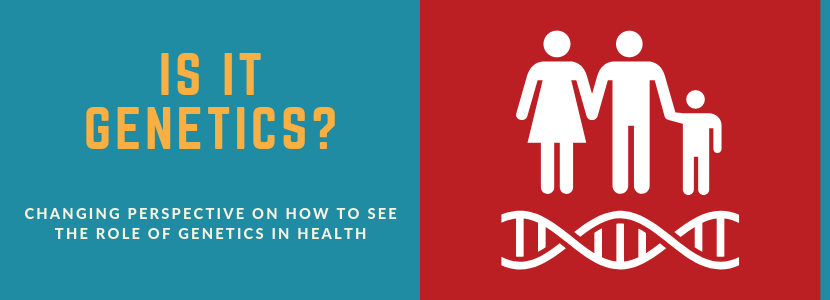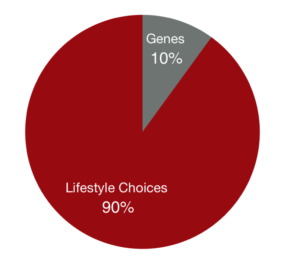
If you’ve ever found yourself saying, “it runs in our family”, you may feel that you are cursed to develop the same things.
Weight issues, thyroid imbalance, mental health conditions, heart disease, diabetes, cancer, etc. It can feel as though we are doomed to experience the same path if others in our family have dealt with these issues.
However, science tells us that’s not exactly true.
The question of nature versus nurture is one that has been around for ages and continues in our modern day. And when it comes to genetics, we ask, “how much does nature play a role in how our health develops versus how we nurture ourselves?”
Our answer?
Both play a role in the disposition of our health, but how we nurture ourselves has much more influence. Many scientists say that our genes only account for 5-15% of our overall health and what we end up developing.
The remainder?
Our choices! Our diet, our exercise routines, how we manage stress, environmental factors, and our overall lifestyle
are major components of what diseases or conditions we may suffer from in the future.
Let’s explain in more detail…
Our genes are a blueprint for our health, but the choices you make are what brings what aspects to life on that blueprint.
For example, you are given a set of materials to build a house. But how you decide to build that house will determine how strong, stable, and safe it is throughout the years.
We all have genetic tendencies, but that does not set us up to be sentenced to the same diseases that those in our family have passed down genes for. It simply means that we have a unique guideline on how we can best live our lives for optimal health.
So what should we do about it?
Start by understanding and becoming mindful of what conditions or diseases are most prominent in your family. Some of us may also opt for genetic testing to determine what specific genes we have inherited.
From there, rather than feeling victimized by the perspective of “I will get that too,” try to change your mentality to, “I know what I may be predisposition to so I will use that to alter my lifestyle choices in order to strive for optimal health.”
This type of perspective can make a difference when we look at what is “recommended” by doctors and government standards. Rather than just following those guidelines, we should work to tweak them based on what we can do to ward off family diseases.
For example, if diabetes is prevalent in your family, taking extra care of your sugar intake, understanding which exercise program is best for insulin resistance, and taking pride in stress management can all be additional aspects you choose to focus on. This may mean going above and beyond the general population recommendations.
But why have diseases been passed down from generation to generation?
Yes, genetics can play a role in this obviously, but so can other determinants. Think about where and how families lived throughout the years. Did they live in similar environments? Did they have similar jobs? Did they eat the same type of foods? Did they all deal with similar stressors?
These answers can provide us insight into why those in previous generations suffered from the same illnesses.
And, not only do we inherit the genes from our parents, but also daily life skills such as:
– how to cope with stress
– what to eat
– exercise habits
– emotional regulation
as well as others. It is these lifestyle characteristics that we live with when we are younger and many times continue on throughout adulthood, not knowing any other options.
It’s important to think about what you learned growing up that may need a little change to try and discourage future disease.
The bottom line when it comes to genetics is that we have genes that have been passed down. But depending on what type of environment they are in can depend on which genes are expressed and how.
Rather than worrying about what you may develop, use that energy to empower yourself to make healthy choices that encourage a healthy environment for those genes.
Are you interested in genetic testing and/or would like recommendations on what to do and what to take based on those result or any inherent family disease that you are aware of?
If so and you live in Castle Rock, Castle Pines, Lone Tree, Highlands Ranch, Centennial, Parker, Larkspur, Monument, Colorado Springs, or the Greater Denver Metro area, please call us at (303) 688-6698 or click here to schedule a complimentary 15 minute consultation with Dr. Graves to discuss your family history and learn what you can do to live optimally.
You don’t have to succumb to your family’s history. You can learn to make one of your own.

Leave a Reply